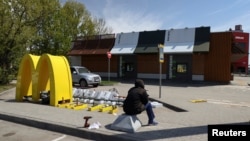On February 9, President Vladimir Putin claimed that despite the exodus of companies from Russia, “nothing has collapsed, and nothing is falling apart”:
“Now many of them [Western companies] are leaving our market under pressure from their governments. … Perhaps some people thought that all this would collapse and fall apart in our hands. But nothing like this is happening – nothing has collapsed, and nothing is falling apart. Our companies, our businesspeople are picking up these companies or even branches and continuing this work with success.”
That is misleading. In response to Moscow’s unprovoked invasion of Ukraine last February, Western governments imposed economic and diplomatic sanctions, and more than 1,000 foreign companies halted or suspended their businesses in Russia.
Sanctions and the exodus of companies have had a cumulative impact on Russia’s gross domestic product (GDP). As of September 2022, Russia's annual GDP decreased by 3.7% - the worst performance in the G-20, which brings together the world's 20 major economies.
Food and beverages
McDonald's, the world's largest fast-food chain, closed and sold off its 850 restaurants in Russia in May 2022. The following month, the new Russian owner opened a chain of 300 restaurants called Vkusno - i tochka ["Tasty – period"]. By September, the new chain had opened 820 locations.
There were problems for the McDonald’s successor from the outset: signs with the letter M were removed from restaurants, but new ones were not displayed; the American brand’s logo on sauces was cheaply painted over with markers; the menu was shortened; French fries disappeared.
Russian media noted food quality problems at Vkusno - i tochka restaurants, with the Kommersant newspaper reporting last July:
“Three residents of Moscow city and Moscow region found mold on their burgers, and two other clients of ‘Vkusno - i tochka’ found insects in their food. Another person said he was sold a sauce whose expiration date was the previous day. And finally, two videos appeared on Telegram channels showing pallets with burger buns kept outside right in the open air, and birds jumping on them."
The customer complaints and social media posts halted abruptly after just a few days, with the new owners labeling the criticism a “provocation,” Kommersant reported.
Advertising and IT
In March 2022, Google, the world's largest seller of online ads by revenue, stopped selling online ads in Russia. Earlier, Twitter and Snap Inc. did the same.
In May, Google announced it would completely stop working in Russia. By that time, most of Google's 240 employees in Russia had already left the country.
Most Russian advertising agencies surveyed in November 2022 estimated the country’s advertising market had declined by 40%-60%, mainly because of the exodus of foreign advertisers and a reduction in advertising by Russian companies.
According to a survey by Ventra, a Russian human resources company, as of September 2022, 31% of IT professionals left Russia or planned to relocate within the next year, while 19% of the respondents were employees of companies that left the Russian market.
Home appliances
The Whirlpool Corporation, an American manufacturer of home appliances, and one of the largest producers of washing machines and refrigerators in Russia, shut down its two factories there in March 2022.
That same month, German multinational company Bosch — another major manufacturer of refrigerators and washing machines in Russia — closed its factory in St. Petersburg. As of February 2023, the company was trying to sell off its Russian assets.
According to Russia’s Federal State Statistics Service (Rosstat), refrigerator manufacturing in the country last year fell by 46.7%, while washing machine manufacturing fell by 68.1%.
Home appliances and electronics have reportedly been the most popular items looted by the Russian troops from Ukraine since the beginning of Moscow’s full-scale invasion last February.
Automobiles
Most global automakers stopped building cars in - and delivering components to - Russia in March 2022. Some have suspended production in Russia indefinitely, while others have sold assets to the Russian government or private Russian investors.
According to Rosstat, automobile production in Russia dropped 67% in 2022 compared with the previous year, with just 450,000 units built – a historic low since 1972. "There is an impact of new projects, but not very significant yet," the Interfax news agency quoted Russian automotive industry market analyst Vladimir Bespalov as saying.
Sales of new cars and light commercial vehicles in Russia fell by 58.8% in 2022, the Association of European Businesses (AEB) reported in January.
According to the Russian Automobile Dealers Association, only 14 out of 60 auto brands remained available for purchase in Russia in 2022. The world's largest brands have stopped production and sales in Russia. They include Ford, Toyota, Nissan, Mazda, Volkswagen, Mercedes-Benz, Opel, Hyundai, Kia, Renault, Citroen and Peugeot.





